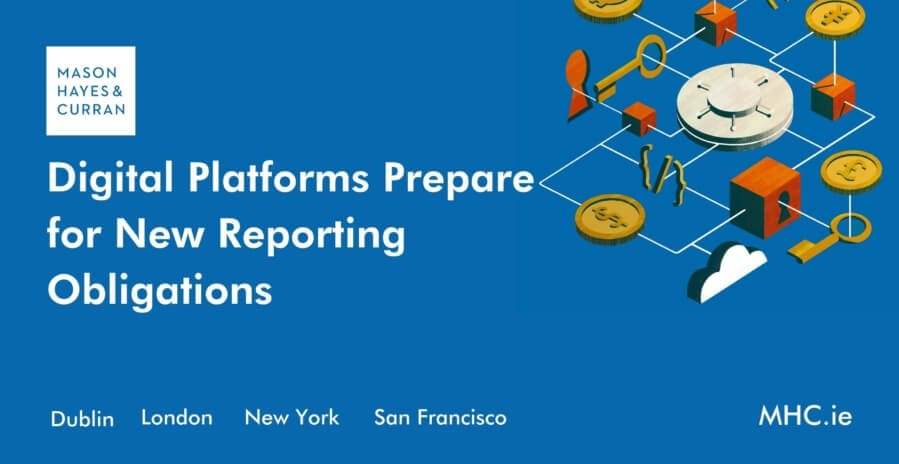
Ireland, like other EU Member States, is in the process of introducing the legislation required to implement Council Directive (EU) 2021/514 (DAC 7). DAC 7 aims to enhance tax compliance in the digital economy within the EU. Under DAC 7, digital platform operators will be required to collect and verify information relating to certain users on their platforms and report this information annually to the tax authorities in one Member State. This information will then be shared with other EU tax authorities and, where relevant, used by tax authorities to improve tax compliance in their jurisdiction.
Finance Act 2021 introduced the Irish reporting obligations for digital platform operators which will take effect from 1 January 2023, although this remains subject to a Ministerial Order. Further Irish legislation is also expected later this year to implement the remainder of the DAC 7 rules. DAC 7 will affect many digital platform operators. We provide here an overview of the new DAC 7 rules and consider what affected companies need to do now to prepare for the new regime.
Digital platforms
The new regime will apply to the operators of both EU based and non-EU based “digital platforms”, which refers to any software, e.g. websites, applications, mobile applications etc., that connects sellers with potential purchasers for the purpose of carrying out a “relevant activity”. It does not include software that exclusively allows the:
- Processing of payments
- Listing of users
- Advertising, or
- Redirection of users to another platform
Relevant activities
Activities or transactions which will trigger a reporting requirement are:
- Rental of commercial or residential immovable property
- Provision of personal services
- Sale of goods, and
- Rental of any mode of transport
Reportable sellers
The reporting obligations only apply in respect of “reportable sellers”, individuals or entities that carry out relevant activities, which are tax resident in the EU or rent out property located in the EU.
Certain entities are excluded from DAC 7, including:
- Listed companies
- Government and state bodies
- Casual sellers, individuals or entities with less than 30 sales on the digital platform and turnover/sales of less than €2,000 in a given year
- High frequency property rentals exceeding certain thresholds like hotel chains or tour operators
Registration
An affected platform is required to register as a platform operator for the purposes of DAC 7 with the competent authorities of the Member State:
- In which it is resident for tax purposes
- In which it was incorporated
- Where it has its place of management, or
- Where it has a permanent establishment
In circumstances where a platform operator is required to register in more than one Member State, it may elect to register in any one of those Member States.
Due diligence and reporting obligations
Platform Operators within the scope of the new rules are required to carry out due diligence procedures to identify Reportable Sellers and take certain steps to check that the data provided is accurate. This will require modifications to existing systems and processes for many platforms.
Digital platforms operators will be required to provide the following details in respect of each reportable seller on their platform:
- Name
- Address
- Tax reference number
- VAT number
- Date of birth/business registration number in respect of each reportable seller on their platform annually
In addition, the platform operator must report:
- The consideration paid to the seller
- Their relevant bank account number
- The number of relevant activities carried out by the seller
- Details of any fees, commissions or taxes withheld or charged by the operator
In the case of property rentals, the address, the property registration number and the number of rental days must also be provided.
Compliance
Penalties for non-compliance with the provisions of the directive are set by the individual Member States. In Ireland, the Finance Act 2021 provides that a fine of €19,045 may be imposed for each failure to deliver a return or for filing an incorrect return. In the case of a failure to deliver a return, a further penalty of €2,535 shall apply for each day on which the failure continues.
Where a seller fails to provide the platform operator with the relevant information after two reminders following the initial request the seller’s account must be closed until the information has been provided.
Timelines
Member States are required to transpose DAC 7 into national legislation on or before 31 December 2022. The provisions should be effective from 1 January 2023 and first reports are due to be filed on or before 31 January 2024.
Preparing for DAC 7
Once implemented, DAC 7 will place a significant administrative burden on digital platforms. There is a need for clarity on some issues, including the scope of the directive, platforms in scope and how it will apply in practice. This is expected to come via further discussions at an EU level and further Irish legislation and guidance from Irish Revenue.
However, digital platforms need to start preparing now by taking the following steps:
- Examine the activities facilitated by their platform to determine whether they are within the scope of DAC 7
- Review existing processes and systems and consider changes what may be required to comply with the due diligence and information collection requirements under DAC 7. Is the required data already being collected? What processes are required to verify the data?
- Assess whether changes are required to customer contracts or communications
- Ensure systems are in place which will allow timely reporting of data to the tax authorities and the closing of accounts where sellers are not compliant.
For further assistance with these issues please contact Niamh Caffrey or your usual MHC contact.
The content of this article is provided for information purposes only and does not constitute legal or other advice.
Share this:






